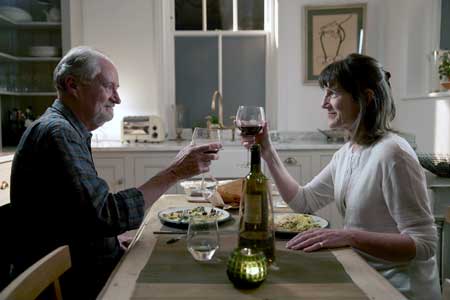Film (2017)
Directed by Ritesh Batra
Screenplay by Nick Payne
based on the novel by Julian Barnes
Kendall Square Cinema, Cambridge, MA
With Jim Broadbent (Tony Webster), Charlotte Rampling (Veronica Ford), Harriet Walter (Margaret Webster), Michelle Dockery (Susie Webster), Matthew Goode (Mr. Hunt), Emily Mortimer (Sarah Ford), James Wilby (David Ford), Edward Holcroft (Jack Ford), Billy Howle (Young Tony), Freya Mavor (Young Veronica), Joe Alwyn (Adrian Finn), Andrew Buckley (Adrian Junior)

Harriet Walter as Margaret Webster
in “The Sense of An Ending”
Photo:Robert Viglasky
Courtesy of CBS Films and Lionsgate
Tony (Jim Broadbent) is divorced from Margaret (Harriet Walter), but they are in quite close contact over the pregnancy of their thirty-five year old lesbian daughter, Susie (Michelle Dockery). Attempting to be close and supportive, Tony is fraught by unseen forces that cause current tensions among his ex-wife, their daughter and himself. He is concurrently consumed by recollection of events long ago with his school friend, Adrian (Joe Alwyn, Andrew Buckley), his youthful flame Veronica (Freya Mavor), her mother, Sarah (Emily Mortimer) and the complex series of relationships that developed between them.
A talented cast embodies this difficult domestic tale and makes it a worthwhile and interesting outing.
Jim Broadbent is always interesting in his portrayals, easily conveying a sense of daunted and unaware innocence while, at the same time, revealing the hint of an underlying critical awareness.
Holding him to account in this regard are three strong women.
As Margaret, Harriet Walter plays solid, tough and yet compassionate in her own way, giving a clear sense of why the marriage failed while also exhibiting compassion for her ex-husband especially in his new role as a grandfather to be.
As the older Veronica, Charlotte Rampling brings her brilliant sangfroid to the fore, revealing very little while letting one know that a lot is happening underneath. Rampling does more with an apparent lack of expression than one can imagine and one comes away with the sense of a character that radiates pain.
As Susie, Tony’s and Margaret’s daughter, Michelle Dockery, so well known for her portrayal of Lady Mary on Downton Abbey, gives a good, clear, modern account here. She carries with her the hauteur of the bearing that made her effective as Lady Mary, but transposed into a contemporary lesbian’s character. Her dignified remove hovers just at the edge of vulnerability here and fits in very well between Broadbent’s innocent bumblings and Walter’s taut ripostes.
The historic psychodrama that occupies the interstices of the current drama interleaves in a suggestive way. One is never quite sure where the two fit together, but the implication is that the unrecognized and unexplained traumas of the past have haunted the present. The title – The Sense of an Ending – confirms the emphasis on sense – that the feeling or awareness of what has happened deep in the past does not, in effect, end anything, but it gives a species of closure that may effect the present.
Alluding at each turn to the dimensions of anguish that a series of betrayals has caused, the film manages to bring home the virtues of unraveling the past in the service of aiding the present. This mystery story, in which small remembered gestures mix with current discoveries, underlines the significance of evocation and retrieval of blurry history to account for major influences on character. Here, the excellently subtle acting by a top notch cast helps significantly to convey the potency of such endeavors. The script does not always convey its purposes as elegantly, but, even so, offers a suggestive template upon which these superb actors can exhibit their talents.
– BADMan
Leave a Reply